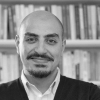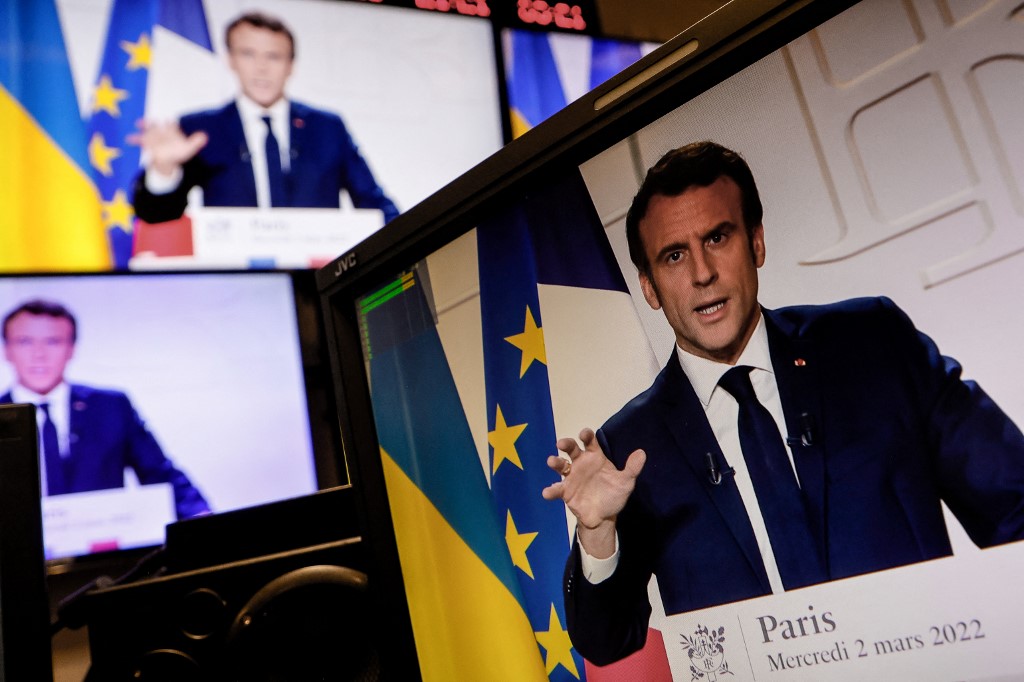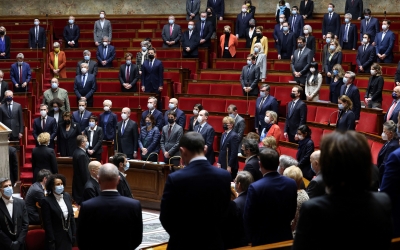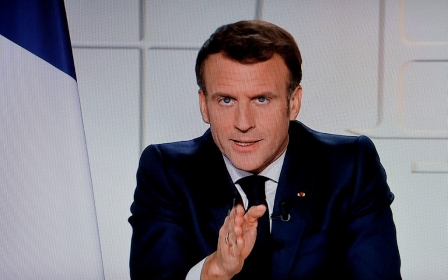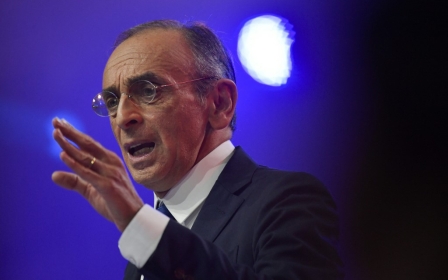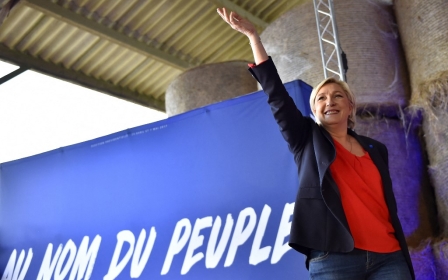France elections 2022: A race to the bottom of far-right politics
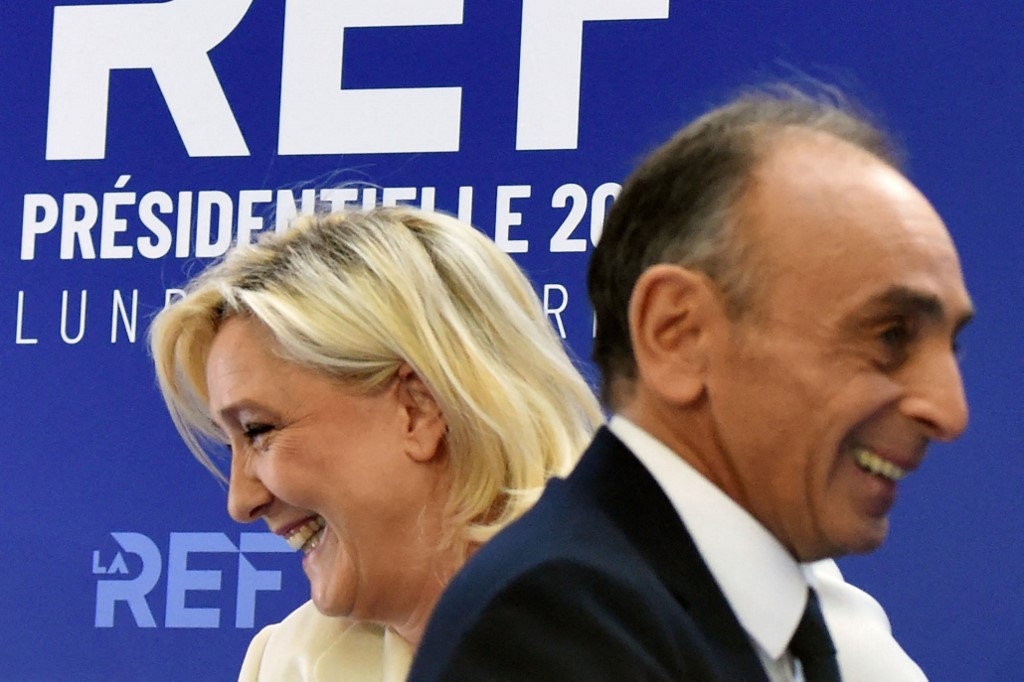
It has become sort of a sad joke. Democracy, pluralism, values, ethics: what they could be, and what political commentators and media pundits make of them.
As the invasion of Ukraine by Russia brings war back to Europe, the French political and journalistic elite are revealing what actually shapes their conscience - the core vision of what it means to be French, European or simply human. And it’s not great.
Thanks to Jean-Louis Bourlanges, president of the National Assembly’s foreign affairs committee, we learn that Ukrainian refugees will comprise “high quality immigration” from which we can “draw profit”. Always available for comment, former L’Express chief editor Christophe Barbier classifies desirable migrants based on their “European culture” and “proximity”, while journalist Philippe Corbe notes: “We’re not talking about Syrians escaping bombs from the Syrian regime. We’re talking about Europeans who leave in their cars, which look just like ours, and who are just trying to save their lives.”
Black and Arab refugees are rejected as an existential threat, while blond and blue-eyed 'quality migrants' ... elicit support and protection
No wonder his colleague Ulysse Gosset is shocked: “We’re in the 21st century, we’re in a European city, and we have missiles being launched, just as if we were in Iraq or Afghanistan; can you imagine.”
Yes, we can. And it unfortunately doesn’t require much imagination to understand what is actually being said: refugees are not the same. Migrants are not the same. Humans are not the same. Depending on their skin colour, religion and “cultural proximity”, some deserve to be supported, welcomed and protected, while others are a danger.
Black and Arab refugees are rejected as an existential threat, while blond and blue-eyed “quality migrants” who are “culturally close” elicit support and protection.
Harassing non-white refugees
EU member states are instantly able to reach a (historically unreachable) consensus to take in Ukrainian refugees for up to three years without requesting that they first apply for asylum, while Paris Mayor Anne Hidalgo has instantly solved the (historically unsolvable) housing crisis in order to free up space for Ukrainian refugees.
This is all great, and as Andrew Stroehlein, the European media director for Human Rights Watch, aptly noted of the EU consensus: “That was quick. And good. Well done. And it proves that all the EU’s past excuses for not acting humanely towards refugees from other recent wars were just bunk. Let them never again say, ‘It can’t be done’. It clearly can.” Especially for blond, blue-eyed refugees, one might add.
Meanwhile, in France, despite this show of solidarity with “civilised” Ukrainian refugees, police are still criminalising and harassing Black, Afghan and Arab refugees; the government is still calling for mass discrimination against Muslim women who wear a headscarf in sport; and politicians continue to target dissent and human rights advocacy, with Aurore Berge calling for Amnesty International to be “dismantled” after it criticised Israeli apartheid.
The upcoming presidential election remains very much focused on Islam, security and immigration, with two far-right candidates (Marine Le Pen and Eric Zemmour) polling around 15 percent each. President Emmanuel Macron’s policies against migrants, minorities and Muslim communities have been some of the most oppressive in decades, with his interior minister, Gerald Darmanin, calling Le Pen’s anti-Islam policies “weak” in comparison.
Desperate to emerge as a contender in this race to the bottom of far-right politics, conservative candidate Valerie Pecresse recently normalised the “great replacement” theory at the biggest meeting of her campaign. This racist, conspiratorial, anti-Muslim theory claims that Muslims and migrants are “replacing” the people of Europe, with the support of the “global elite”.
Huge democratic gap
Meanwhile, on the “left”, communist candidate Fabien Roussel is apparently more worried by veganism than by this racist campaign: “I am not an ayatollah who wants to forbid everything, from the Christmas tree to the Tour de France or meat. Life with quinoa and tofu is bland. This is not my France.”
Other candidates have tried to broach discussions on issues such as climate change, health, education or the ongoing dismantling of public services in France, but they haven’t gained much traction in the current campaign.
This has created a huge democratic gap between the priorities identified by everyday French people, which revolve around environmental, social and economic issues, and the priorities chosen by some media and leading political forces, who want to retreat to racism and divisive politics.
This is sad, but it is no longer a joke. France is in a position where the far-right is not a threat anymore. At this point, it’s a political framework already implemented by the current government, which desperately tries to save face internationally by posing as a champion of freedom.
Dismissed as uninformed or unable to grasp the complexity of the “French universalist model”, international criticism has in fact been valid. Such values only hold if they are translated into actions that effect change. So far, however, the only change the French government has effected has been to create the systemic conditions for the far right to be the leading political force in the country.
The upcoming elections are just about quantifying the extent of this reality.
The views expressed in this article belong to the author and do not necessarily reflect the editorial policy of Middle East Eye.
This article is available in French on Middle East Eye French edition.
Middle East Eye propose une couverture et une analyse indépendantes et incomparables du Moyen-Orient, de l’Afrique du Nord et d’autres régions du monde. Pour en savoir plus sur la reprise de ce contenu et les frais qui s’appliquent, veuillez remplir ce formulaire [en anglais]. Pour en savoir plus sur MEE, cliquez ici [en anglais].


